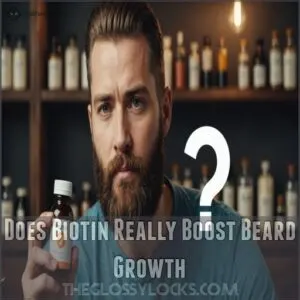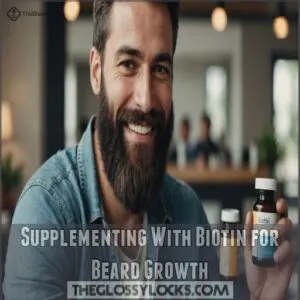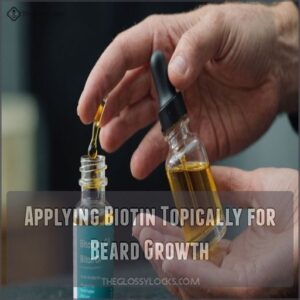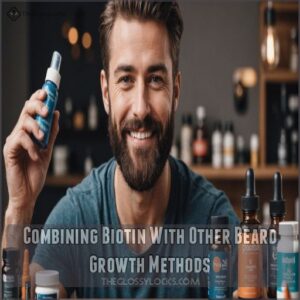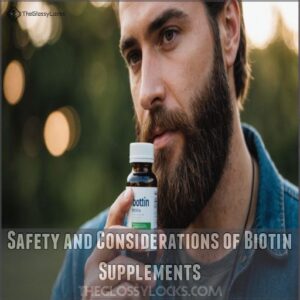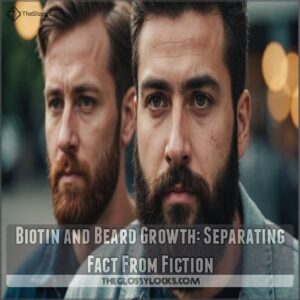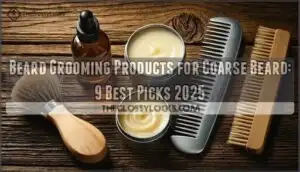This site is supported by our readers. We may earn a commission, at no cost to you, if you purchase through links.
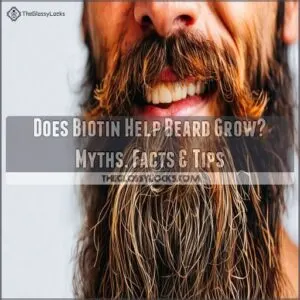 You’re probably wondering, does biotin help beard grow?
You’re probably wondering, does biotin help beard grow?
Well, biotin is a B vitamin that strengthens hair and nails, so it might give your beard a little boost.
It plays a role in keratin production, essential for hair health.
However, the scientific evidence linking biotin directly to beard growth is sparse.
Most claims arise from anecdotal experiences.
If you’re not deficient in biotin, additional supplements might not make a noticeable difference.
Remember, a balanced diet, rich in vitamins and minerals, remains important for hair health.
Want to know how biotin stacks up against other growth strategies?
There’s much to unpack!
Table Of Contents
- Key Takeaways
- What is Biotin and Its Role in Beard Growth
- Does Biotin Really Boost Beard Growth
- How Does Biotin Contribute to Beard Growth
- Biotin for Beard Growth: Strategies and Considerations
- Safety and Considerations of Biotin Supplements
- Biotin and Beard Growth: Separating Fact From Fiction
- Biotin for Beard Growth: What to Expect
- Frequently Asked Questions (FAQs)
- Does biotin help in beard growth?
- What is the recommended intake of Biotin per day to promote hair growth?
- How to grow a beard with biotin beard cream?
- How much biotin should I take a day for beard growth?
- Which vitamin helps beard growth?
- Will biotin help regrow men’s hair?
- How do you stimulate beard growth?
- Does anything actually help beard growth?
- Can biotin help with patchy beards?
- What foods are rich in biotin?
- How long before biotin shows beard results?
- Is biotin effective for all hair types?
- Can biotin cause any allergic reactions?
- Conclusion
Key Takeaways
- You might find biotin helpful for beard thickness and health, but it’s not a magic fix; it’s best used alongside other growth strategies.
- Biotin supports keratin production, which is essential for healthy beard hair, but scientific evidence directly linking it to beard growth is limited.
- A balanced diet rich in vitamins and nutrients, including biotin, is crucial for healthy facial hair, and supplements should be considered in consultation with a doctor.
- Improvement in beard density with biotin might take 3-6 months, and factors like genetics also play a significant role in growth.
What is Biotin and Its Role in Beard Growth
Biotin, or vitamin B7, is essential for metabolizing nutrients and producing keratin, a key protein in hair.
While it’s not a miracle cure, certain nutrients like those found in sperm’s antioxidant properties may support hair growth by reducing oxidative stress, biotin may support beard growth by strengthening follicles and enhancing hair health.
Biotin Benefits for Beard Hair
Thinking about getting a thicker beard?
Biotin might be your new best friend.
This vitamin, known for boosting keratin production, helps with beard thickness, length, and texture.
While you can’t rely solely on biotin supplements for a full beard, they can complement other beard growth vitamins.
For a truly majestic beard, consider combining biotin with a balanced diet and proper grooming.
Biotin Deficiency and Its Impact
Biotin deficiency can throw a wrench in beard growth plans.
This condition, although rare, leads to noticeable changes in hair, skin, and nails.
Fortunately, taking high-quality biotin supplements can help counteract these changes.
The root causes might include:
- Poor enzyme levels
- Intestinal malabsorption
- Specific medications
- Genetic factors
- Diet lacking in biotin-rich foods
Recognizing these symptoms can help guide effective biotin deficiency treatment strategies.
Biotin and Hair Growth
Sometimes overlooked, biotin plays a pivotal role in hair growth.
It helps metabolize proteins essential for hair follicle health.
Without it, you might notice weaker facial hair growth or Biotin deficiency symptoms like brittle nails.
Biotin supports keratin production, important for strong hair strands, countering hair growth myths.
While not a magical fix for all, it’s necessary for maintaining healthy hair follicles.
Biotin for Beard Growth: Benefits and Effectiveness
So, you’ve learned about biotin’s role in hair growth. Understanding this vitamin’s benefits, like its presence in Andrea Hair Growth supplements that can boost new strand production, can help you make informed decisions about your hair care routine.
Now, let’s talk beards!
Biotin, or vitamin B7, might help your beard grow thicker and longer.
Studies show it strengthens hair follicles.
However, it’s not a magic bullet.
A balanced diet and consistent skincare routine are key.
Consider a biotin supplement, but check with your doctor first about the right biotin dosage and potential biotin side effects.
Remember, results vary!
Does Biotin Really Boost Beard Growth
You might be wondering if biotin can actually turn you into the bearded wonder of your dreams.
We’ll explore the scientific evidence and determine whether biotin lives up to the beard-boosting hype.
Studies on Biotin and Beard Growth
You’re curious if biotin really boosts beard growth.
Scientific evidence on biotin’s effect on beard growth is limited, but some clinical trials suggest potential benefits for hair.
These studies indicate a link between biotin supplementation and hair regrowth and thickness, though most focus on scalp hair.
Research shows that biotin deficiency can lead to symptoms like thinning hair or even hair loss, a condition that can be addressed through a recommended daily intake of biotin supplements.
The connection to beard follicles remains under investigation, leaving room for more research findings.
Biotin Dosage for Beard Growth
After exploring biotin’s potential link to enhanced beard growth, let’s tackle the specifics of biotin dosage.
While some men experiment with doses between 500 and 10,000 mcg, starting with a balanced biotin supplement is wise.
Remember, biotin’s water-soluble nature means excess is safely excreted.
Stick to safe dosage ranges, monitoring any noticeable changes in your beard’s fullness and health.
Combining Biotin With Other Growth Strategies
Blend biotin with other beard growth strategies like a perfect recipe for success.
Use beard oil to moisturize, eat a balanced diet, and exercise regularly to boost circulation.
Prioritize sleep, because rest regenerates hair cells.
While biotin for beard growth isn’t a magic bullet, combining it with these methods can enhance results, leading to a thicker, healthier beard.
How Does Biotin Contribute to Beard Growth
Understanding how biotin contributes to beard growth involves looking at its roles in hair follicle health and keratin production, both very important for thicker beard hair.
Biotin basically acts as a support system, enhancing the quality and strength of your facial hair, which might just help you win the endless struggle against patchy beards.
Biotin’s Role in Hair Follicle Health
Biotin offers essential support to hair follicles, contributing to healthy beard growth by enhancing the hair growth cycle and preventing hair loss.
For those looking for supplements to support their beard growth journey, products like the ones found in online stores for Biotin Beard Growth can be a good starting point.
While it won’t make you an overnight beard guru, its role in beard growth stages is significant.
- Supports follicle health
- Enhances hair growth cycle
- Aids in beard growth stages
- Promotes hair loss prevention
- Found in beard growth foods
Biotin and Keratin Production
Healthy hair follicles are key to a thriving beard.
You see, biotin helps build keratin, the protein that makes up your hair.
Think of it as the building block for strong, healthy beard growth.
A biotin deficiency can impact keratin production, potentially slowing down growth.
So, ensuring you have enough biotin supports this process, giving your beard the best chance to flourish.
It’s a fundamental part of the equation.
Biotin’s Impact on Beard Hair Thickness
Ever wondered if biotin can thicken your beard?
This vitamin supports keratin production, which strengthens hair follicles and may help increase beard hair thickness.
Missing out on biotin might lead to patchy facial hair, so consider these tips to boost your beard growth:
- Explore biotin-rich foods.
- Try biotin supplements.
- Focus on overall nutrition.
- Consult your doctor.
Biotin for Beard Growth: Strategies and Considerations
To potentially enhance beard growth, consider integrating biotin-rich foods into your diet and using supplements.
Remember, using biotin cream and combining these methods with other growth strategies can improve results, though it’s no miracle cure.
Including Biotin-Rich Foods in Your Diet
Switching up your diet with biotin-rich foods can give your beard growth a little boost.
Imagine enjoying eggs and nuts with a side of bananas—all packed with beard-friendly nutrition.
Incorporating supplements like those discussed in Natural Hair Growth Supplements for Thinning Hair, which contain biotin, can help promote healthier growth. These dietary changes are natural supplement alternatives to help you eat for growth.
| Food | Biotin Content (mcg) | Mood Impact |
|---|---|---|
| Eggs | 10 | Energized |
| Almonds | 6 | Satisfied |
| Bananas | 0.2 | Happy |
Supplementing With Biotin for Beard Growth
Imagine this: you’re eyeing that luscious beard, and biotin might be your secret weapon.
As vitamin B7, biotin supports beard health by strengthening follicles.
Many find that biotin supplements can boost growth, but it’s not magic.
Start with a safe biotin dosage to see effects.
Remember, biotin vs. other supplements may vary, so explore what works best for you.
Applying Biotin Topically for Beard Growth
You’ve tried supplements for beard growth, but have you considered biotin cream or beard oil for a topical application?
With DIY recipes and product reviews buzzing, these can nourish hair directly.
While beard growth sprays claim magic, remember it’s about fostering natural beard growth.
Boosting keratin with biotin in your routine might just be the ticket to fullness.
Combining Biotin With Other Beard Growth Methods
After applying biotin topically, consider other growth-boosting methods.
Pair biotin with a wholesome diet, regular exercise, and stress reduction.
A good beard wash and quality beard oil can enhance your facial forest.
Experts agree—adequate sleep heals, aiding beard growth.
This holistic approach helps biotin’s effectiveness while promoting skin health and a robust beard.
Balance is key!
Safety and Considerations of Biotin Supplements
Before you start popping biotin pills like candy, let’s talk safety.
While generally safe, biotin can interfere with some medical tests and medications, so it’s always best to chat with your doctor before starting any new supplement regimen.
Potential Interactions With Medications
When considering biotin for beard growth, it’s wise to keep an eye on potential interactions with medications.
Biotin can affect how certain medications, like anticonvulsants and antipsychotics, work in your body.
This can lead to safety concerns if drug effects are altered.
Always chat with your healthcare provider before starting biotin supplements to make sure everything’s in harmony.
Taking high doses of biotin can also interfere with lab tests, so it’s essential to discuss your biotin supplement regimen with your healthcare provider, especially regarding recommended daily intake, such as the 30 mcg for adults found in Recommended Daily Intake.
Always chat with your healthcare provider before starting biotin supplements to make sure everything’s in harmony.
Effects on Lab Test Results
Worrying about medications? Let’s talk tests. Biotin supplements can skew lab results, making them trickier than a cat on a leash.
Your thyroid and troponin tests, very important for heart attack checks, aren’t immune.
Before panicking, and if you’re looking to complement your biotin intake with a beard growth oil, consider exploring options like beard growth oil for men beard growth oil.
Inform your doctor about your biotin intake. Pause biotin before lab tests. Double-check those results. Biotin’s benefits should outweigh any test confusion!
Toxicity and Excretion of Biotin
Biotin’s safety is often a relief for many supplement users, as this water-soluble vitamin doesn’t linger in your body.
It’s swiftly metabolized, and excess amounts are eliminated through urine, minimizing toxicity concerns.
However, understanding biotin dosage is essential since it can interfere with certain lab tests.
Always factor in potential biotin side effects and interactions to ensure safe use.
Consulting a Healthcare Provider
Understanding the body’s biotin excretion is key, yet consulting with a healthcare provider goes the extra mile for safety. Biotin supplements can interact with medications and impact lab tests, particularly affecting thyroid health and heart conditions. Here’s why you should chat with your doctor:
- Medication interactions
- Lab test effects
- Thyroid health concerns
- Heart condition risks
- Personalized advice
Biotin and Beard Growth: Separating Fact From Fiction
You might’ve heard that popping biotin pills could magically thicken your beard, but is there any truth to this claim?
Let’s explore the science to uncover what biotin really does for beard growth and bust common myths along the way.
Debunking Common Misconceptions About Biotin
Before you rush to order biotin supplements, let’s tackle some myths.
It’s not a magic pill for beard growth.
Genetics play a significant role, so biotin mightn’t work wonders for everyone.
Despite its benefits, biotin isn’t side effect-free for all.
Believing solely in biotin myths might lead to unrealistic expectations.
Keep these realities in mind.
Understanding Biotin’s Role in Beard Growth
So, you’ve busted those biotin myths.
Now, let’s get real about its role in beard growth.
Biotin, or vitamin B7, helps build keratin, the protein making up your beard hairs.
A biotin deficiency can slow growth, but more isn’t always better.
Think of it as a supporting player, not a star.
A healthy diet and good hair follicle health are key for a full beard.
Consider supplementing, but always check with your doctor first.
Biotin Vs. Other Beard Growth Supplements
Considering various beard growth options, biotin stands out but faces competition from other supplements like Minoxidil, Saw Palmetto, and DHT blockers.
Each targets different growth factors—where biotin boosts keratin, Minoxidil stimulates follicles, Saw Palmetto manages DHT, and a balanced diet and lifestyle support overall health.
Weigh their benefits, consult your goals, and tailor your approach to beard growth.
Realistic Expectations for Biotin’s Effectiveness
Switching gears from comparing beard growth supplements, let’s discuss realistic expectations for Biotin.
You might hope for quick results, but patience is key.
Expect individual variations based on your genetics and lifestyle.
While Biotin can help, other factors like diet and health play roles too.
It’s like planting a tree: time and care matter more than a miracle quick fix.
Biotin for Beard Growth: What to Expect
When you start using biotin for beard growth, expect gradual changes rather than instant miracles.
In the short term, you might notice subtle improvements,
while long-term use can help maintain and enhance overall beard health.
Short-Term Effects of Biotin on Beard Growth
Moving from myths to reality, let’s discuss what biotin can do for your beard in the short term.
Initial beard growth may show subtle changes, but don’t expect a miracle.
Here’s what you might notice:
- While the rate of beard growth can vary, understanding the average hair growth rate of approximately half an inch (1.25 cm) per month, as influenced by factors such as age and genetics average hair growth in a month. Faster growth rate: Some hairs may sprout more quickly.
- Beard thickness: Individual hair strands can feel thicker.
- Visible changes: Overall, look for slight volume increase.
Stay consistent to maximize these enhancements.
Long-Term Effects of Biotin on Beard Growth
Ever wonder if biotin really delivers long-term benefits for your beard?
While there’s no magic bullet, biotin supports sustained growth and improves beard thickness by enhancing hair follicle health, which relies on biotin’s role in keratin production.
Over time, this mighty B vitamin may give your beard a fuller, healthier look.
It’s like giving your beard a workout—consistency and patience are key for the best results.
Combining Biotin With Other Beard Growth Strategies
When you’re thinking about beard growth over time, it’s worth considering different strategies.
Combining biotin with beard oil can promote healthier follicles.
Add exercise to increase blood circulation, a balanced diet for essential nutrients, and manage stress to keep hair loss at bay.
Together, these strategies might enhance your beard’s thickness and shine, giving your facial hair the best chance to flourish.
Maintaining Beard Growth With Biotin
Because consistent beard growth requires a holistic approach, maintaining your beard’s length with biotin involves more than just supplements.
A balanced diet rich in biotin-rich foods supports healthy hair follicles.
Consider a consistent beard care routine, including gentle cleansing and conditioning.
Remember, a proper biotin dosage, whether from supplements or diet, is key.
Patience is essential; noticeable results take time.
Frequently Asked Questions (FAQs)
Does biotin help in beard growth?
Picture your beard like a garden needing tender care; biotin acts like a gentle rain, nourishing growth.
It might help boost beard thickness and health, but don’t expect a magic fix.
It complements other growth strategies.
What is the recommended intake of Biotin per day to promote hair growth?
Aim for a biotin intake of 120 mcg daily to support hair growth.
Some people choose higher dosages like 500 to 10,000 mcg.
Always check with a healthcare provider before making a major increase to your dosage.
How to grow a beard with biotin beard cream?
Slather biotin beard cream like magic paint on your thinning beard areas, massaging it gently into the follicles.
This helps stimulate growth and strengthen hair.
Pair with a beard brush for untangling, boosting its fabulous effect.
How much biotin should I take a day for beard growth?
To promote beard growth, try taking 500 to 10,000 mcg of biotin daily.
While there’s no strict dosage rule, many men report improved beard thickness and growth speed with higher amounts.
Always consult a healthcare provider first.
Which vitamin helps beard growth?
Biotin, or vitamin B7, is a key player.
It supports healthy hair growth, including your beard.
Consider a supplement, but always check with your doctor first.
A balanced diet helps too!
Will biotin help regrow men’s hair?
Men hoping to regrow hair might find biotin helpful, as it strengthens hair follicles and supports growth.
While evidence links biotin to healthier hair, consult your doctor before starting supplements, especially if you’re on medications.
How do you stimulate beard growth?
Boost beard growth by sticking to a balanced diet, rich in biotin and vitamins.
Regularly massage your face to improve circulation.
Maintaining adequate biotin levels, ideally around the estimated daily biotin intake, can support your overall health and, in turn, naturally enhance your facial hair’s growth potential. Manage stress levels and make sure you get enough sleep to naturally enhance your facial hair’s growth potential.
Does anything actually help beard growth?
You can potentially boost beard growth by maintaining a healthy diet, reducing stress, and using supplements like biotin.
While these methods might help, genetics play a big role, and results can vary between people.
Can biotin help with patchy beards?
Untamed patches on your beard might see improvement with biotin.
This vitamin supports hair health, potentially thickening growth.
While it’s not magic, pairing biotin with a balanced diet and care might fill those patchy spots.
What foods are rich in biotin?
Looking to up your biotin intake?
Try eggs, almonds, cauliflower, and whole grains.
They pack a punch of this vitamin B.
Plus, meat and dairy products offer a tasty, nutritious biotin boost for your diet.
How long before biotin shows beard results?
Imagine noticing thicker hair after about 3-6 months of consistent biotin use.
While individual results vary, patience is key.
Regular intake combined with a balanced diet may gradually promote healthier, denser beard growth over time.
Is biotin effective for all hair types?
Biotin’s effectiveness isn’t guaranteed across all hair types.
While it often helps, individual responses vary.
Factors like genetics and overall health play a significant role.
Consult a doctor before starting supplements.
Can biotin cause any allergic reactions?
Some might say biotin‘s as gentle as a kitten, but it can cause rare allergic reactions.
Symptoms include rashes, itching, or swelling.
Always check the label and consult your doctor if you have allergies or sensitivities.
Conclusion
Curious if biotin really helps beards grow, as it’s known to improve keratin production and strengthen hair for a fuller beard appearance according to methods for growing a thicker beard. Biotin really helps beards grow thicker and faster?
The reality is, while biotin plays a role in keratin production and hair health, solid evidence linking it directly to beard growth is limited.
If you’re not deficient, extra biotin mightn’t be your beard’s miracle cure.
Instead, focus on a nutritious diet and combine biotin with proven methods for better results.
Always weigh your options and consult with experts before jumping into supplements promising magical transformations.


